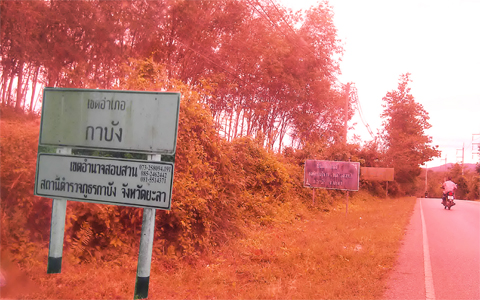Is Emergency Decree effective in deterring violence?

I understand the reason and the necessity for the military to use special law such as the Emergency Decree in the restive deep South because for most of the violent cases which took place there eyewitnesses were nonexistent and the perpetrators were motivated with special reasons that the use of Criminal Procedure Code alone to deal with the cases was almost impossible.
And all the talks about the application of forensic science and good intelligence to deal with the insurgency are, in reality, easier said than done because that will require adequate manpower and equipment as well as a huge budget.
But I share the opinion of many others that the Emergency Decree has been enforced for far too long – more than seven years already with altogether 29 extensions each for a period of three months. At issue here is if the Emergency Decree is to be lifted, how can it be done? Or if the decree is to be extended, how can it be justified?
For the first question, it should start with the military accepting the fact that the Emergency Decree has failed to convince the people that they will be safer because of the law. A case in point was the car bomb attack in Sai Buri district of Pattani on September 21 in which six people were killed and more than 40 injured. Many people have raised the question about the efficiency of the checkpoint system because security forces failed to even detect that the explosive-laden pickup truck bore two unidentical number plates. How could the truck elude the security checks?
Or an incident a month ago in Kabang district of Yala, the military claimed that the dead victim killed by security forces was a suspected militant. But villages claimed the victim, a 16-year old boy, was innocent. Or the case in Raman district of Yala, four days afterward when security forces stormed a krathom (a form of narcotics) brewery killing one and injuring two others. Local villagers questioned the use of excessive force to deal with the case.
I do not want to put the blame on any parties for the above-mentioned incidents as the direct result of military operations under the special law. But there have been petitions seeking justice for incidents occurred in the course of military operations although they were no longer reported by the media. But words of mouth persist among local villagers and still they were ignored by state authorities who didn’t bother even to make clarifications. The result is the lack of confidence in state authorities among the locals which renders impacts on the Emergency Decree.
Such complaints of alleged injustice and abuses have provided a good excuse for the militant gangs to exploit and to expand their base support. Suffice to say that the longer the Emergency Decree is enforced, the greater the problem and the loss of public support. Why not a try to lift the decree for –say three months – and evaluate the unrest situation. If there are still major violent incidents, then the decree can be reimposed immediately with the need of a cabinet’s approval.
The proposal that the decree be lifted gradually in one district after another depending on how serious the situation is has been received with reservations from several sectors on the ground that this is tactical wrong. The right approach is to completely lift the decree in all three southernmost provinces and then reimpose the decree on selected areas.
Even without the special law, security forces can still set up roadblocks and perform their duties as usual because Martial Law is still enforcible. But authorties can detain a suspect for at most seven days instead of 30 days under the Emergency Decree.
If the military intends to retain the Emergency Decree, then there must be certain ground rule to be observed for instance how many violent incidents are to be reduced with the special law still in force. More importantly, local people should have a say in determining whether the law should be extended or not.
Moreover, the public should be allowed to have access to some crucial information that will prove the effectiveness or ineffectiveness of the Emergency Decree. A case in point is the claim by Maj-Gen Nakrob Boonbuathong, deputy director of the 5th Coordinating Centre, that of 30 bombs planted by the militant gangs, the military managed to defuse 29 of them with only one successfully detonated. Is such claim real?
--------------------------------------------------------------------------------------------------------------
Caption : The way to Kabang district
